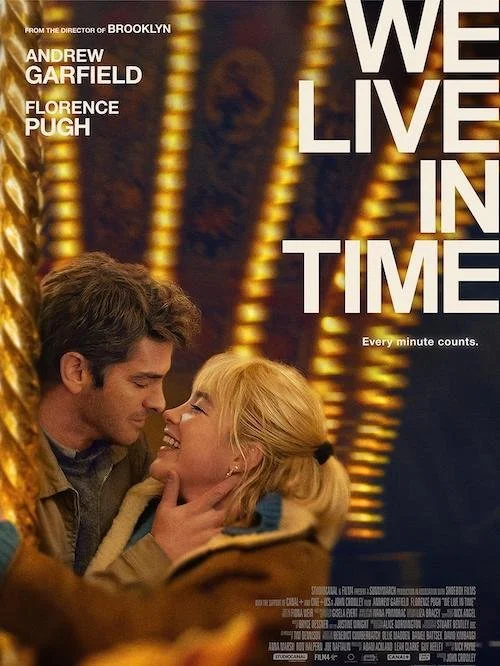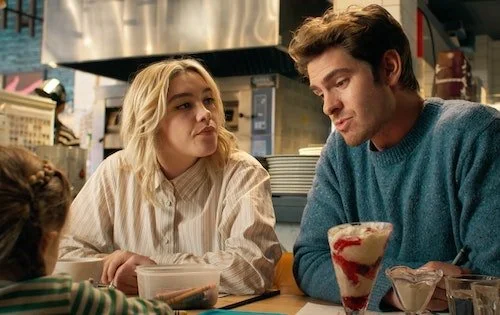We Live in Time
Written by Andreas Babiolakis
Warning: Spoilers for We Live in Time are present in this review. Reader discretion is advised.
It can be difficult to critique a film that shares a personal connection with me, especially one as heavy as grief; life will always matter more than art (but, then again, art acts a crucial vessel for elements of life, and even life itself, so art is also crucial). When watching a film like We Live in Time, the latest work by director John Crowley (of Brooklyn fame; the 2015 film is a fantastic entry in the romantic dramedy subgenre), it’s difficult for me to be too harsh despite noticing some pacing and narrative lulls that slow down a film that is meant to capture the unstoppable speed of existence. I don’t want to sit here and judge a work that helped me heal even just a little bit during its hour-forty duration. Having lost my mother last year, I still haven’t fully accepted this dismal fact, and I don’t think I ever will at this rate. A film like We Live in Time is a reminder that our lost loved ones live not just in our memories and our sharing of their stories, but in the lessons we’ve learned that have shaped us; they live through us. In this film, the life of Almut Brühl (Florence Pugh) remains in twenty four frames per second. Her successes as a high class chef live through her widower husband, Tobias (Andrew Garfield) and their daughter in the final scene as he teachers the little one how to properly crack eggs; Almut will never be fully gone.
It may seem strange to begin a review with the ending of a film, but it makes a smidgen of sense when you consider the biggest trait that We Live in Time possesses is that it is not told in chronological order. We begin with Almut’s cancer diagnosis with husband Tobias fully supporting her, and the next sequence shortly afterwards is how Almut and Tobias met (oddly enough, Almut hit Tobias with her car and tended to him in the hospital as an apology); we see both the spark of the beginning, and the beginning of the end, at the same time. The entire film leaps through time, but some moments work far better than others. Sometimes, we get interesting contrasts or comparisons between the different time periods of this marriage, like when Almut is pregnant versus when she is in the midst of chemotherapy (and the different bodily challenges she undergoes). Other time jumps don’t prove to be as effective, and it appears as though We Live in Time is simply having to keep up its gimmick because it has one in the first place.
While the time-jumping concept of We Live in Time doesn’t always stick its landing, we have two powerful performances by Florence Pugh and Andrew Garfield to keep us going.
As a result of the moments when the flashbacks don’t work as well as Crowley intended, We Live in Time occasionally buckles under its own pressures, particularly a second act crawl that should feel like a celebration of a wonderful marriage and lovely people but instead appears to be the family vacation clip show that won’t end and can cure insomnia. These moments are saved by two fantastic performances by Pugh and Garfield who are sensational together (and are just as magnetic when separated). Pugh is equal parts charming in a goofy way and powerful (the latter when she is going through her cancer battle and other turmoils); then there is the scene of Almut giving birth where Pugh turns in some of her best acting yet (her perseverance and commitment in this sequence and numerous others strengthens every scene of We Live in Time, because we never forget the triumphs and strength of our lost loved ones). Garfield is the right supporting actor to have here as he allows Pugh to shine but never fully fades into the background either. I fully bought that this was a married couple whose lives we were intruding on thanks to these great actors of our time.
When We Live in Time works, it’s a beautiful look at how we can honour our favourite people when they are gone. Even at its weakest, it is an earnest effort. I feel like there’s potential for an even stronger film here, but I also don’t care all that much when We Live in Time works well enough to comfort people like myself. I have low points where I reflect on how much I miss my mother and am finding it difficult to get through hardships without her. Having watched We Live in Time, I’m reminded that she’s still with me in various ways; the lessons she taught me that I now pass on to others; the stories I love sharing, even if I’ve brought them up a thousand times before; she’s even in We Live in Time, as I revisit her refusal to ever give up during her battles with cancer within the character of Almut. A film that isn’t perfect in an objective sense can still be therapeutic, moving, and nurturing, and for that I think We Live in Time is perfect for its mission. Its lesson never vanishes throughout its runtime because Crowley, Pugh and Garfield put everything into helping all of us lost souls reconnect with the dearly departed. I thank them for that.
Andreas Babiolakis has a Masters degree in Film and Photography Preservation and Collections Management from Toronto Metropolitan University, as well as a Bachelors degree in Cinema Studies from York University. His favourite times of year are the Criterion Collection flash sales and the annual Toronto International Film Festival.






